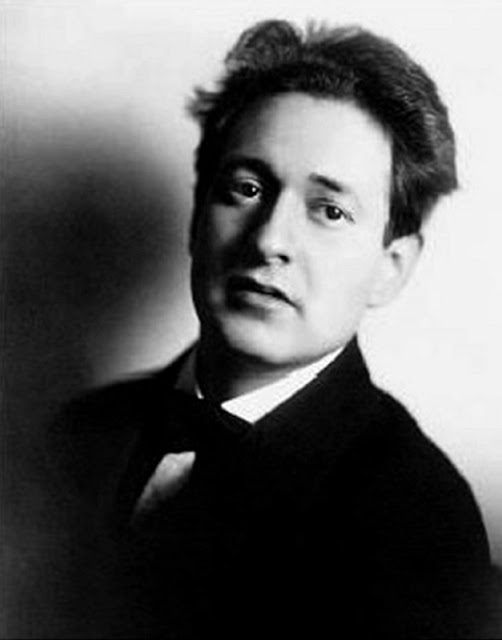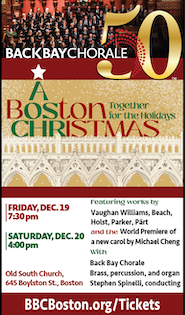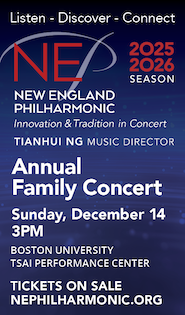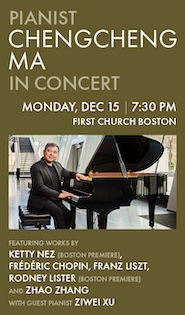Odyssey Opera glows in belated Boston premiere of Korngold’s “Die tote Stadt”

Erich Wolfgang Korngold’s opera “Die tote Stadt” was performed Saturday night in a concert version by Odyssey Opera.
Entering its second season, the aptly-named Odyssey Opera looked over the horizon for ambitious musical adventure on Saturday night, and brought back the Boston premiere of an opera that was once the toast of the world, Korngold’s Die tote Stadt.
They say that classical music is for gray-haired people, so it must have been gratifying for many in Saturday night’s audience at New England Conservatory’s Jordan Hall to hear a sliver-topped tenor perform almost unimaginable feats of vocal stamina as the death-obsessed protagonist in Korngold’s grandly Romantic masterpiece.
The energetic and colorful concert performance under the organization’s musical director Gil Rose starred Jay Hunter Morris as Paul, a morose citizen of Bruges, Belgium, whose unhealthy attachment to the memory of his dead wife Marie ends up annoying everyone else in the cast. Sung well, as Morris did Saturday, his unremittingly high and intense vocal part can have a similar effect on the listener.
Morris was making his Boston debut Saturday night, as was soprano Meagan Miller in the opera’s other principal role, the dancer Marietta doubling as a vision of the dead Marie.
The 23-year-old Wunder who composed this portrait of a man with one foot stubbornly planted in the grave was hailed at the time (1920) as the next Richard Strauss or the next Puccini, but eventually went to Hollywood and became the one and only Erich Wolfgang Korngold.
Korngold’s lush movie scores of the 1930s and ‘40s, which illuminated every twitch of mood in Errol Flynn swashbucklers and drawing-room dramas, were amply prefigured in Die tote Stadt, whose simple plot—man misses his late wife, sees a woman who looks like her, can’t decide what to do about it—really had no right to be so interesting for three hours in a theater.
It was Korngold’s music that made the difference, ripely Romantic one moment and starkly dissonant the next, as Paul’s state of mind went from rapturous to (as other characters called him) verwirrt, bewildered. Death’s appeal twined around him in seductive falling chromatic scales, while dancing, leaping motives tried to beckon him to life.
Happily, except for the title, the opera’s libretto—written under a pseudonym by the composer and his father, a prominent music critic—retained only vestiges of the urban symbolism of its source material, a novel titled Bruges la morte that found a metaphor for death in that Belgian city’s chilly fog, murky canals, and glum piety.
Instead, the Korngolds emphasized the playable character conflict and gorgeous vocalism, richly supported, that made this opera a favorite of European opera houses throughout the 1920s, and a frequent revival since.
In the opera Paul was saved, in the best Freudian fashion, by a dream, in which he pursued the Marie-lookalike, possessed her, and, tormented by his infidelity, murdered her. All of Act II and most of the third and final act took place in the dream, whose illogical logic gave the young composer—who wrote the libretto—license to reach deep into his bag of musical imagery, throwing together a profusion of musical symbols, including a children’s chorus, monks in procession, and street revelers outside the window of Paul’s claustrophobic apartment/shrine to Marie.
To achieve these effects, Korngold expertly wielded every Straussian device of orchestration and invented quite a few of his own, using the large orchestra discreetly but colorfully in the opening scenes, then building it in the climactic dream scenes to a roar capable of covering even so redoubtable a tenor as Morris, who has recently earned praise for his Siegfried at the Met.
Musical characterization was everywhere in evidence, as when the horns glowed under the lines of Paul’s faithful friend Frank, then emitted Mahlerian whoops under Paul’s agitated answers.
Rose’s and the orchestra’s rendering of this brilliant score was a model of precision, force, and tone chemistry. In opera, the orchestra isn’t supposed to be the show, but in a concert version like Saturday’s it inevitably is, and so one was a little too aware of the players’ constant busyness, an effect increased by a certain un-Viennese rigor in the performance. An opera that poked fun at a German character, Fritz, for his stiffness had a touch of that itself on Saturday.
As Paul, Morris might be accused of oversinging in this intimate hall with his armor-piercing tenor, but if the goal was to convey the character’s obstinacy in the face of the other characters’ good sense, he did all that and more. And on the too-rare occasions when the composer called for it, Morris demonstrated that he could dial back vocally to mezzo voce or a near-whisper to capture an emotional nuance.
And just to say it again, Morris’s voice never let him down, even though he was onstage in full cry for most of the opera’s three long acts.
With its earnest overall tone, this performance didn’t always find the right note for its lighter, more life-affirming material, the counterweight to Paul’s dark obsessions. Soprano Miller, as the dancer whom Paul fixates on for her resemblance to Marie, seemed at first to play the ditzy chick a bit too much, and in a cast of substantial operatic voices the touch of breathiness in her sound seemed like a deficiency.
But as the character eventually locked horns with Paul, standing up for her right to party, Miller’s singing became more grounded too, and expression flowered in her part’s ecstatic upward leaps. As the vision of Marie, standing dramatically side-lit in a doorway behind the orchestra, Miller subtly changed character to sing affectingly of love for her spouse and the opera’s central message to choose life, with all its imperfections, over death.
Weston Hurt pleasingly sang the Horatio-like role of Frank, whose job much of the time is to stand a little awkwardly and look concerned for his friend Paul, in a forward yet rich-sounding baritone. As an actor, he might have made his engagement with Paul, both as a friend in real life and as an amorous rival in the dream, a little more emotionally convincing.
The role of Brigitta, Paul’s housekeeper, is present largely for plot exposition in the first scene, and thereafter as a bit of an anchor to reality for her verwirrt employer. Mezzo-soprano Erica Brookhyser sang it feelingly in a clear, bell-toned voice, phrasing naturally yet also dealing easily with sudden leaps in the melody.
Doing their best to bring a little levity to the dead city was a sextet of Marietta’s friends and theatrical types, sung amusingly by Thomas Meglioranza, Frank Kelley, Sara Heaton, Janna Baty, Alan Schneider, and Jonas Budris. Meglioranza was affecting as the shy German Fritz, venturing a nostalgic love song about the Rhine, and Budris showed a pleasing tenor in a few snatches of serenade.
Like Mahler, Korngold turned to scenes from folk life for grounding in times of social and psychological stress. Portraying the religious festival outside Paul’s window, singers arrayed around the Jordan Hall balcony included youngsters from the Boston City Singers and the Cambridge Children’s Chorus chirping a pious ditty, and members of the New World Chorale as the chanting monks.
And although moments of high drama, such as Act II’s final duet with its daring accompaniment of sharp staccato chords, gave this work its modern edge, the emotional heart of the evening was the folksong-like, deeply nostalgic Gluck, das mir verblieb, introduced by Marietta and answered by Paul as their love began to flower. Morris, Miller and Rose gently stopped the show with that one, and Morris did so again near the opera’s end, reprising the tune after Paul wakes from his dream.
As Paul left the scene to go out and rejoin life without Marie or Marietta, the opera closed on a note of quiet acceptance. The acceptance by the audience of this boldly ambitious performance was, however, anything but quiet.
The performance will not be repeated. The next presentation of Odyssey Opera will be a double bill of fully-staged one-act operas by Dominick Argento, A Water Bird Talk and Miss Havisham’s Wedding Night, 8 p.m., Nov. 22, and 3 p.m., Nov. 23, at Suffolk University’s Modern Theatre. odysseyopera.org; 617-826-1626.
Posted in Performances



Posted Sep 15, 2014 at 1:10 pm by Stephen Owades
I’m puzzled by the reference to Jay Hunter Morris as a “sliver-topped tenor.” Given the context of the sentence, that presumably was meant to read “silver-topped,” but Mr. Morris is blond and not grey- (or silver-)haired. Heldentenors don’t tend to be young, and Mr. Morris–who is emerging as one of the best in this fach today, thanks to his debut in the Met’s Ring as Siegfried–is 51 years old. Not exactly a geezer!
Posted Sep 15, 2014 at 7:52 pm by Robin Kaplan
Jay Morris’ performance was the best thing about Odyssey Opera’s concert version of Die Tote Stadt. The role of Paul is unbelievably demanding. The high tessitura and the fact that Paul is onstage for most of the opera together make this one of the most demanding tenor roles in all of opera. Just listen to two of the most well-known recordings of Die Tote Stadt (the Leinsdorf/Kollo/Neblett premiere recording, and the Segerstam/Dalayman version), and it will be immediately clear how well Morris sang the role. There was no strain evident is his performance, no harshness at all. His sound was beautiful throughout, an amazing achievement. Unfortunately, the same cannot be said of Miller’s Marie/Marietta. Her voice is too small for this role, and in some of the higher reaches she was nearly inaudible. This is a dramatic soprano role, though not necessarily Wagnerian is scope. Carol Neblett’s performance as Marie/Marietta is a demonstration of how a singer can deploy her instrument to maximum benefit, and remains the definitive Marietta performance. If Neblett and Morris (or better yet, Kaufmann!) could be cast together, that would be a Die Tote Stadt for the ages…
Posted Sep 16, 2014 at 9:04 am by Brendan G Carroll
Thank you David Wright! For once, a considered and insightful review of Korngold and this opera in particular. I hope this performance was recorded for wider enjoyment by those not able to attend. Thank you for taking such trouble over your review and for getting the facts correct – a rare thing nowadays.